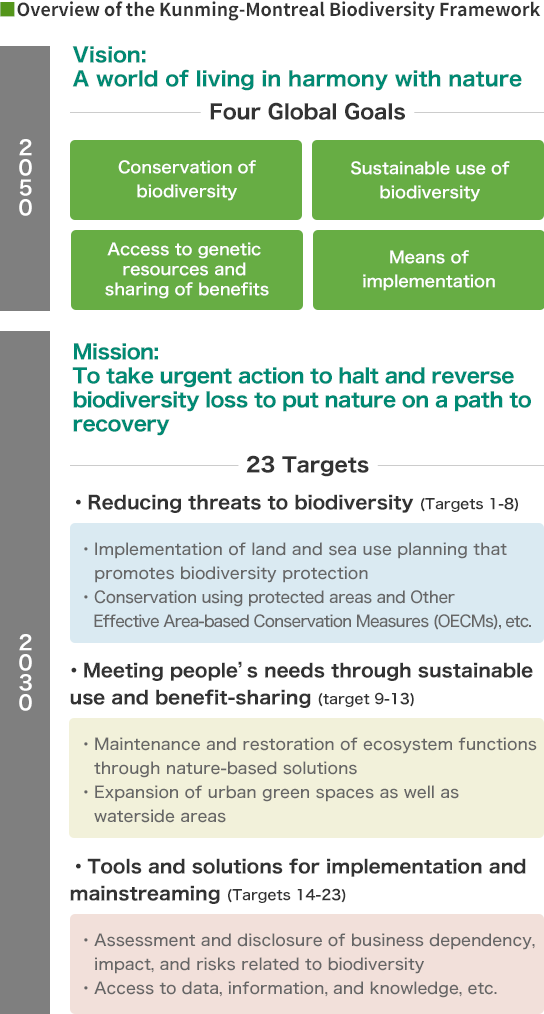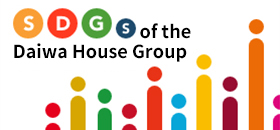Social issues The importance of biodiversity conservation
A major environmental issue that interacts with climate change
Over the past 50 years, ecosystem loss has been accelerating worldwide. According to the Living Planet Report 2022 published by the World Wildlife Fund (WWF) in October 2022, the Living Planet Index (LPI), which tracks changes in the relative abundance of wild species populations, has decreased by 69% during the period from 1970 to 2018.
This ecosystem loss is attributed mainly to global warming and the excessive consumption of natural capital by humanity. A report jointly published in 2021 by the Intergovernmental Science-Policy Platform on Biodiversity and Ecosystem Services (IPBES) and the Intergovernmental Panel on Climate Change (IPCC) indicates that biodiversity loss and climate change are interrelated issues.
Therefore, to ensure a sustainable future, companies must work not only to mitigate and adapt to climate change, but also to reduce ecosystem damage and loss. The 2022 World Economic Forum identified key global risks for the next decade, and “biodiversity loss and ecosystem collapse” and “natural resource crises” were ranked just below climate change. This highlights the importance of ecosystem protection to the business community.

Living Planet Index (1970-2018)
Source: Created by Daiwa House Industry using information from the World Wildlife Fund (WWF) and the Zoological Society of London (ZSL) (2022)
Ranking of Long-Term Global Risks
(estimated impact severity over the next 10 years)
- 1. Failure to mitigate climate change
- 2. Failure of climate-change adaptation
- 3. Natural disasters and extreme weather events
- 4. Biodiversity loss and ecosystem collapse
- 5. Large-scale involuntary migration
- 6. Natural resource crises
- 7. Erosion of social cohesion and societal polarization
- 8. Widespread cybercrime and cyber insecurity
- 9. Geoeconomic confrontation
- 10. Large-scale environmental damage incidents
Global goal to become nature positive
Nature positivity is an approach that emphasizes halting the loss of natural ecosystems and promoting efforts for their recovery. The Kunming-Montreal Framework was adopted at the December 2022 UN Climate Change Conference (COP15) held in Montreal. This framework includes the 2030 Mission, which represents the urgent global objective to become nature positive by 2030, and it establishes 23 targets to support the achievement of the mission.
These targets encompass ecosystem protection measures such as land and sea use planning that takes into consideration biodiversity and the restoration of degraded ecosystems. They also cover the fundamental transformation of economic activities, including the changing of production and consumption patterns. Furthermore, they require companies and financial institutions to assess the impact of their business activities on biodiversity and disclose this information.

(Source: “Outline of Japan’s New National Biodiversity Strategy (Part 1),” Ministry of the Environment)


Industry challenges and response measures Japan’s unique ecosystems
Japan is home to some of the world’s rare and unique ecosystems, and approximately 40% of the approximately 7,000 species of trees and plants native to Japan are found nowhere else. This is due to the country’s warm and rainy climate, its long archipelago extending from north to south, and its complex terrain including mountains over 3,000 meters high. Being a nation of islands makes it more difficult for non-native species to gain a foothold, which has allowed Japan to develop distinctive ecosystem networks over the centuries.
In the past 50 years, however, Japan has experienced significant biodiversity loss and degradation. This makes it crucial for companies in the construction industry not only to avoid destroying existing ecosystems, but also to help protect and nurture them. They must first assess the impacts of development appropriately and take measures to minimize biodiversity loss. Moreover, to restore the heath of ecosystems, these companies need to conserve important ecological areas, utilize traditional rural landscapes such as satoyama, and create ecosystem networks that provide better connections between ecosystems and prevent habitat fragmentation.
To mitigate and adapt to climate change and enhance societal resilience, it is also critical to actively incorporate nature-based solutions, including green infrastructure technologies. Finally, providing better quality of life through urban greening, park development, and other initiatives is an important way to promote people’s physical and mental health and well-being.


Response measures Vision of the Daiwa House Group
With its Biodiversity Guideline [Development & Community Creation], the Daiwa House Group has established voluntary standards for its biodiversity conservation activities. We utilize a checklist based on six criteria and ABINC certification standards to ensure that our large-scale development projects do not destroy native ecosystems. By building houses, facilities, and urban developments that function in harmony with the natural environment, we are helping to expand the amount of high-quality green space in communities. We are working to secure habitats for native flora and fauna in urban areas, which help create organic ecosystem networks. This allows us to foster high-quality communities that offer residents tranquility, thereby promoting attractive urban development.



